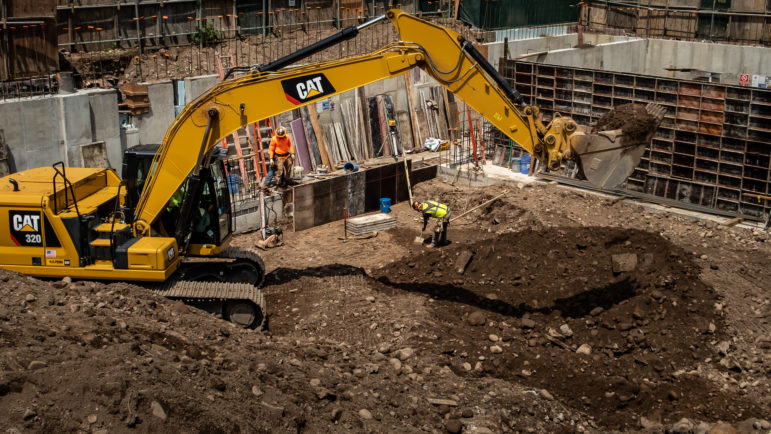The restored funding could lead to the creation of estimated 11,000 units of affordable housing, according to Rachel Fee, Executive Director of the New York Housing Conference, and comes at “a time when those homes are sorely needed.”

Adi Talwar
Ongoing construction work at a HPD site located at West 126th Street.The de Blasio administration announced it would restore $466 million to the current fiscal year’s housing capital budget—which had seen a $1 billion cut earlier this year, to the dismay of advocates—in order to meet its affordable housing goals. However, the Department of Housing Preservation and Development’s capital budget still has a $583 million gap for the current fiscal period.
The city budget adopted in July had previously moved that $466 million from HPD’s Fiscal Year 2021 capital budget to Fiscal Years 2022 through 2024, part of a larger city effort to meet an estimated $9 billion revenue shortfall amidst the pandemic. Advocates had pushed back against the cuts, saying they would deal a major blow to the city’s affordable housing goals in exchange for just modest savings: two separate analyses found the reductions would have resulted in the loss of 21,000 affordable units, 22,176 construction jobs, 12,096 jobs in other related industries and the loss of $7.98 billion in economic spending.
The restored funding announcement comes as the city is preparing to unveil its capital commitment plan in the coming weeks, which authorizes the city to finance new and on-going projects — detailing costs, project length and unexpected expenses for example rezoning plans, infrastructure or school construction.
“Stable, affordable housing is critical to the health and well-being of New Yorkers, and we are doubling down on our ambitious housing goals,” Vicki Been, deputy mayor for housing and economic development, said in a press release. “These funds will maximize our production pipeline, prioritizing NEW housing for those who are most in need, while also putting people back to work.”
The restoration of this HPD funding could lead to the creation of an estimated 11,000 units of affordable housing, according to Rachel Fee, Executive Director of the New York Housing Conference, and comes at “a time when those homes are sorely needed.”
“While we applaud the move, we will continue to advocate for the full restoration of last year’s cuts to affordable housing,” she said in an emailed statement.
According to the New York State Association for Affordable Housing (NYSAFAH), besides the creation of new apartments, the restored funding will also likely lead to economic growth: a typical 100-unit affordable housing project in New York can lead to an estimated 175 construction jobs, 20 additional permanent jobs, such as property managers or building staff, and $3.6 million in sustained local economic activity.
“The decision today to restore the Department of Housing Preservation and Development’s capital budget for Fiscal Year 2021 reaffirms the city’s commitment to addressing the affordable housing crisis. The reductions, had they stood, would have prevented the construction of thousands of affordable homes and slowed our economic recovery,” NYSAFAH president and CEO Jolie Milstein said in a statement. “With more New Yorkers than ever experiencing homelessness and housing insecurity, it is encouraging to see City Hall step up and say clearly that help is on the way.”
The city’s affordable housing plan is aimed at creating or preserving 300,000 housing units across the five boroughs—120,000 new units and 180,000 preserved units—by the year 2026, a benchmark the de Blasio administration say it’s on track to meet. The total cost of the housing plan is projected to be $82.6 billion funded through city, state and federal support, and through private investment monies.
In June, the city cut $583 million from HPD’s capital commitment plan for 2020 and cut an additional $457 million from 2021; some of the capital funding was taken from 2020 and 2021 was shifted into plans for 2022 and 2023, according to the Independent Budget Office.
The City Council was able to save some critical housing programs from the chopping block during the budget agreement in July, though other initiatives like a pilot program to help legalize basement apartments—saw their budget’s cut drastically.









